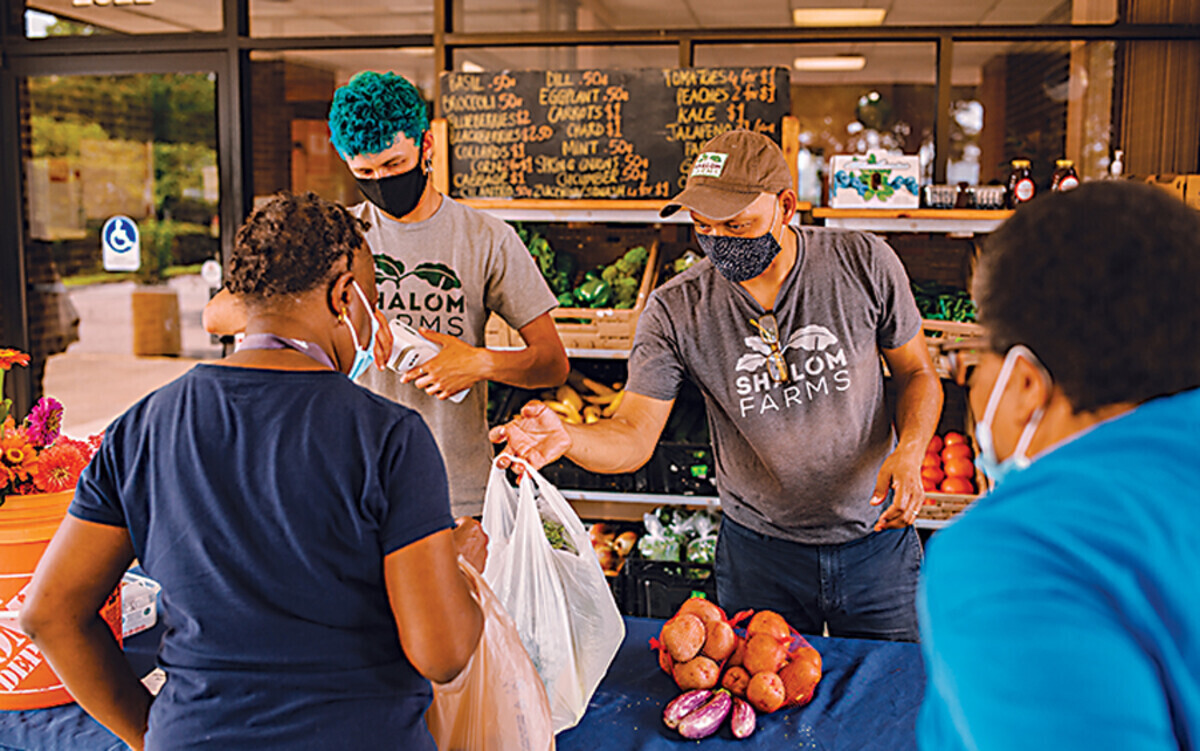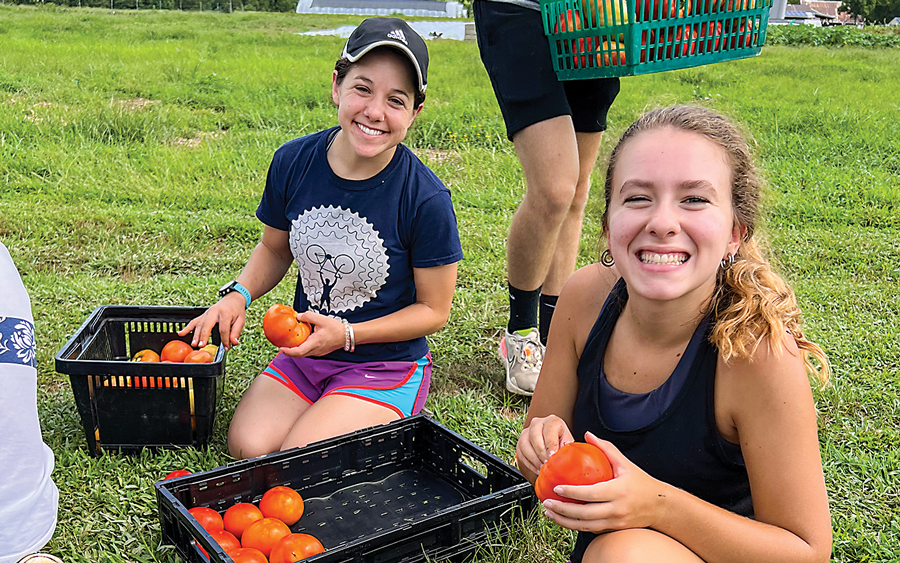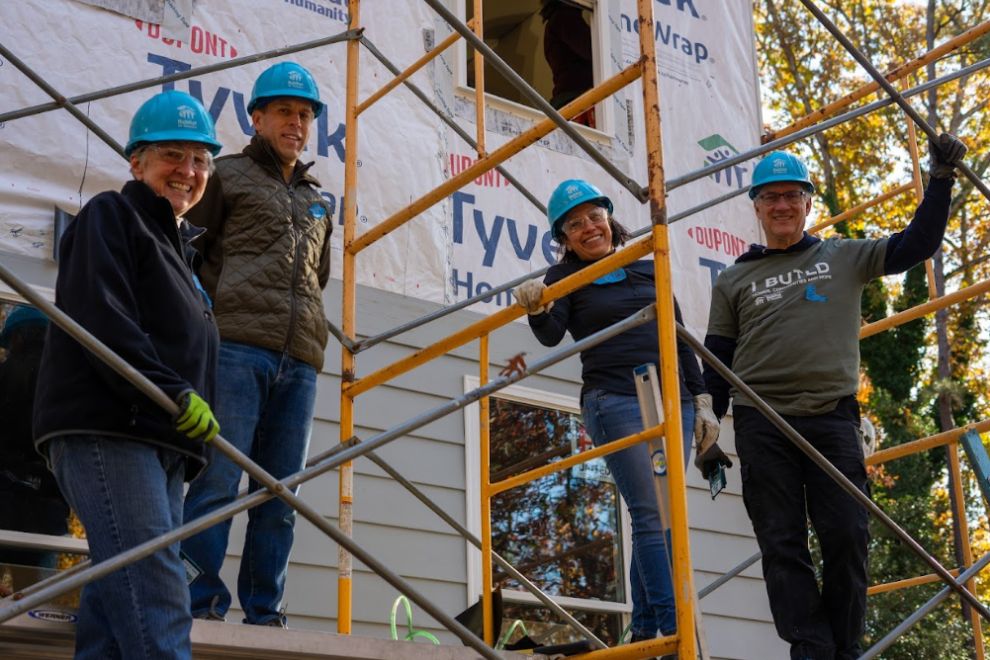Julie has volunteered with Shalom Farms for two years. As a lead volunteer, she has committed to volunteering for at least one shift per week across the entire growing season.
“I believe the mission to get healthy food and education about healthier cooking and eating to those who don’t have access to it is incredibly valuable,” says Julie. “I volunteer regularly at Shalom Farms because this work directly contributes to the overall health of the community.”
Each season, with the help of thousands of volunteers like Julie, Shalom Farms grows fresh produce on two farms in Powhatan and Northside. Volunteers perform a myriad of tasks – from working the soil, planting, and weeding, to harvesting, sorting, and packing up produce and other products for market and distribution.
“Our volunteers put their hands in the dirt for the cause,” says Änna Ibrahim, who serves as executive director of Shalom Farms.
Committed to Increasing Nutritious Food Access
Founded in 2009, Shalom Farms aims to increase food access in Richmond by growing healthy food not only for, but with area families. Last year, the two farms grew more than 110 tons of produce that became meals for 10,000 individuals and families all over Richmond.
Working with partner organizations like Mutual Aid Distaster RVA, Ginter Park United Methodist Church, Feed More, and the Underground Kitchen Community First, Shalom Farms provides free produce to hundreds of Richmond residents every week. For those who can choose to purchase food, Shalom Farms operates mobile markets four days a week from May through December, selling high-quality produce for donation-subsidized affordable prices in Northside, East End, and Southside Richmond.
This year, the services are expanding. “In addition to selling almost sixty tons of fruits and veggies sustainably grown by staff and volunteers at the two farms, the mobile markets will also offer eggs, grains, and other produce sourced from local small and midsize farms, many of which are owned by Black and brown farmers,” says Ibrahim.

Healthy Eating and Healthy Community
Shalom Farms also partners with health clinics throughout the city to offer Produce Rx. The program, which was introduced in 2013, provides participants with a weekly produce box and uses food to help mitigate chronic health challenges, like diabetes and heart disease.
According to one participant, “living alone on a limited budget can make it hard to focus on healthy choices.” The Produce Rx program helped her eat healthier, and as a result she was able to come off of blood pressure medication.
Produce Rx program enrollees can continue the conversation around food and hone their skills at Shalom Farms’ food-skills classes. Jason Muckle is the community engagement manager with Shalom Farms. His mantra is: Food is a language that everyone deserves to speak! Incorporating fresh produce into cooking, Muckle uses quick, delicious, and simple recipes that incorporate easy-to-find ingredients.
Working for Food Justice
Beyond growing fresh and healthy foods, as a nonprofit farm and food justice organization, Shalom Farms is committed to working for an equitable food system in the Richmond region. “We know that many Richmond residents are cut off from direct and meaningful access to local food,” says Ibrahim.
Together with partners, neighbors, supporters, and other farmers who seek to address barriers to food access, Shalom Farms is committed to long-term solutions. “We want to have a lasting impact, ensuring our children and children’s children will not face these same barriers. We know we will not single-handedly create an equitable Richmond,” says Ibrahim. “Doing that will take all of us, working collectively, creatively, and effectively to find the right solutions to make much needed and much necessary change real.”
Ibrahim is convinced Richmond has all the right pieces to solve this problem: passionate farmers and producers; highly skilled urban and rural agriculture educators; powerful grassroots and institutional organizations committed to realizing lasting transformation; connected and motivated citizens who understand food justice and historic inequities; and abundant resources.
“As we look ahead, Shalom Farms is hoping to continue to grow,” says Ibrahim, “…grow fresh produce in the fields, grow education around farming and food systems, grow small farmers and producers within the community, grow viable solutions and partnerships, and grow our collective impact – both on and with our community.”

Three Great Ways to Support Shalom Farms
1. Book a field trip or tour of the farm. Through schools, workplaces, churches, and friends, volunteers connect with Shalom Farms for field trips or farm tours. These educational opportunities help folks learn about food production, food access, and food justice. Visit shalomfarms.org to schedule a field trip or tour.
2. Volunteer. Your labor on the farms directly impacts production. Visit shalomfarms.org to learn more about volunteering your time and talent.
3. Donate. Make a tax-deductible donation to help Shalom Farms staff programs and buy the supplies needed to keep doing the work. Visit shalomfarms.org/donate to make a gift today.





